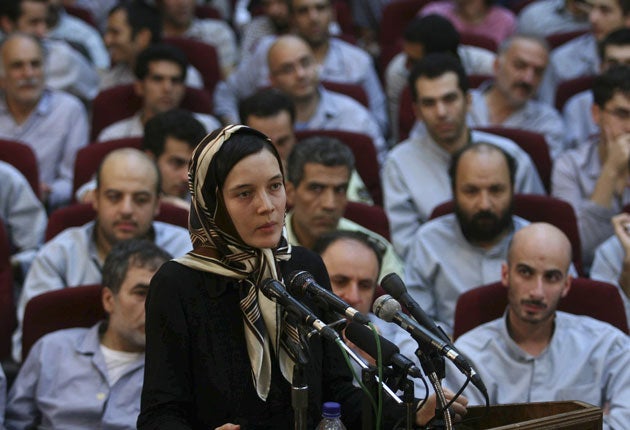Hardliners seek to put opposition in the dock
As show trials resume, Revolutionary Guard chief points finger at Mousavi

Your support helps us to tell the story
From reproductive rights to climate change to Big Tech, The Independent is on the ground when the story is developing. Whether it's investigating the financials of Elon Musk's pro-Trump PAC or producing our latest documentary, 'The A Word', which shines a light on the American women fighting for reproductive rights, we know how important it is to parse out the facts from the messaging.
At such a critical moment in US history, we need reporters on the ground. Your donation allows us to keep sending journalists to speak to both sides of the story.
The Independent is trusted by Americans across the entire political spectrum. And unlike many other quality news outlets, we choose not to lock Americans out of our reporting and analysis with paywalls. We believe quality journalism should be available to everyone, paid for by those who can afford it.
Your support makes all the difference.Iran's most powerful internal political and economic institution, the Revolutionary Guard, intervened in the country's political crisis yesterday by calling for Mirhossein Mousavi and two other opposition leaders to be tried for fomenting political unrest.
"The question is, who were the main planners and agents of this coup?" Yadollah Javan, a commander of the Guards' political bureau said. "If Mousavi, Karoubi, and Khatami are main suspects behind the soft revolution in Iran, which they are, we expect the judiciary to go after them, arrest them, put them on trial and punish them".
A revolutionary court resumed hearings at the weekend in a mass televised trial of more than a hundred opposition and reformist figures, journalists, foreign embassy staffers and other "rioters", provoking outrage among Western governments and clashes in Tehran.
Yesterday's hardline comments suggest pressure may be growing from within the Revolutionary Guard – which has strengthened its grip during the crackdown – for the show trial process to be extended to include Mr Mousavi and the other defeated presidential challengers.
The conduct of the trial may also reflect the disarray in the Iranian regime, say observers. The manner in which prominent figures are paraded in prison garb and forced into humiliating public apologies for their "crimes" is doing little to stifle opposition but at the same time it is serving to undermine the credibility of the judicial system and intensifying Iran's international isolation. Among those in the dock on Saturday accused of being ringleaders of the post-election unrest were a local employee of the British embassy and a French university teacher.
Their inclusion caused astonishment in London and Paris. EU governments are now expected to discuss sanctions and other diplomatic measures against Iran in protest.
In a confession which analysts said appeared stilted and forced, Hossein Rassam, a political analyst at the British embassy told the court that he had provided his employers with assessments of public opinion before and after the election.
The alleged French espionage agent, Clothilde Reiss, 24, looking pale and anxious, confessed to the court that she had sent an email to a colleague in Tehran describing the protests that she witnessed in Isfahan. She had completed a short stint as a teaching assistant at a university in the city and was waiting for a flight out of Iran on 1 July when she was arrested.
"I apologise to the Iranian people and the court and hope they will forgive me", Ms Reiss was quoted by Fars news, an Iranian news agency, as saying. The report said the court was told that the academic's father was a senior French nuclear official and that her mother was "a member of the French army".
An attempt to quell public discontent came meanwhile with the arrest of the head of Kahrizak detention centre. At least three people died in the centre after being taken into custody during protests.
One of those who died was Mohsen Ruholamini, the student son of a leading conservative figure in the regime. Esmail Ahmadi-Moghaddam, Iran's chief of police said the centre's head warden had been "sacked and detained".
Join our commenting forum
Join thought-provoking conversations, follow other Independent readers and see their replies
Comments